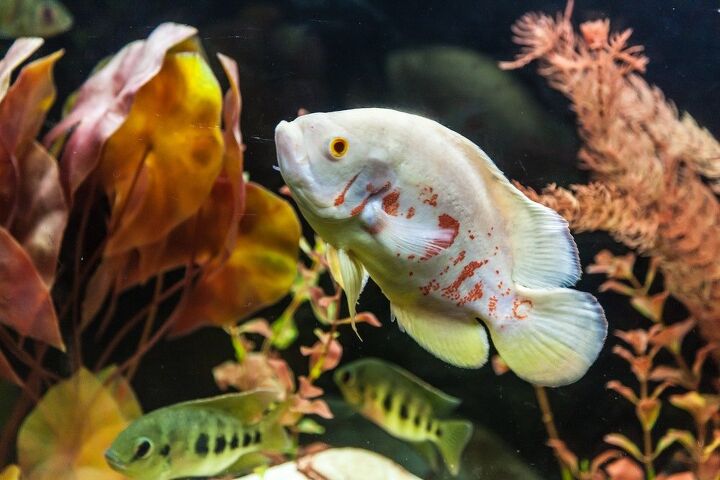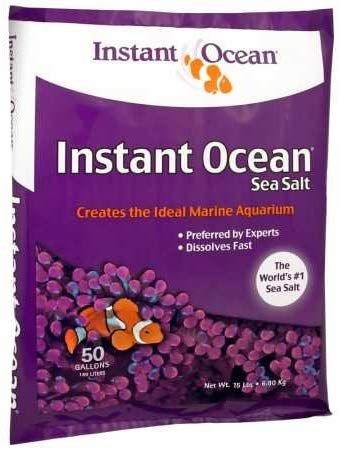Our Guide to the Best Aquarium Sea Salt

Are you interested in setting up a salt water tank? Then you’ll need our guide to the best aquarium sea salt.
Saltwater aquarium fish are some of the most colorful species in the world. As beautiful as they are, however, they can be challenging to keep. With a freshwater tank, your biggest worries are maintaining the right tank temperature and keeping the water quality high. These things are important for a saltwater tank as well, but you have the added challenge of maintaining a salinity level as close as possible to the natural salinity of the ocean. Creating a natural oceanic environment in your saltwater tank requires a number of things, most importantly aquarium sea salt.
In this article, we’ll explore the subject of maintaining a saltwater aquarium and you’ll receive some simple tips for doing so. You’ll also see our top 10 picks for the best options in aquarium sea salt.
The Best Options for Aquarium Sea Salt
Maintaining a saltwater tank is not an impossible task, but it does come with a few challenges that are very different from keeping a freshwater tank. One of the most important aspects of saltwater tank maintenance is achieving and maintaining the right level of salinity. That’s where aquarium sea salt comes in. It pays to start with a quality product, so read on to see our top picks below.
Here are our top picks for the best aquarium sea salt:
Instant Ocean Sea Salt for Marine Aquariums
Available in bags sized for 10, 25, 50, 160, and 200-gallon tanks, this marine salt is fast-dissolving and completely free from nitrate and phosphate. Plus, it contains all the major and minor trace elements a saltwater tank needs.
Instant Ocean Reef Crystals Salt for Reef Aquariums
This aquarium sea salt is specifically formulated for reef aquariums, so it contains all of the essential ocean reef elements in higher concentrations than natural ocean water. Plus, it contains extra calcium for coral growth.
Red Sea Fish Pharm Coral Pro Marine Salt
The ideal mix for reef aquariums, this marine salt encourages healthy but accelerated growth with enhanced vitality for corals.
Tropic Marin Pro Reef-Bucket for Aquariums
This product consists of pharmaceutical-grade sea salt designed specifically for the marine aquarium. When used regularly, it helps maintain optimal conditions at a consistent level in your saltwater tank.
Brightwell Aquatics Neomarine Marine Salt
Made in the United States, this marine salt is proven safe and effective. It is a precision salt blend uniquely formulated for reef aquariums.
Seachem Vibrant Sea Highly Concentrated Synthetic Sea Salt
If you’re looking for an aquarium sea salt that replicates natural marine and reef conditions, try this option. It provides accurate seawater concentrations of magnesium, calcium, and strontium in your reef tank.
Omega Sea Premium Marine Salt
This premium marine salt is made in the USA and is designed to mimic the chemical composition of natural sea water with no nitrates or phosphates.
Seachem Brackish Salt
Some aquarium fish live in an environment between saltwater and freshwater – it is referred to as brackish. If you are cultivating a brackish tank, you’ll need brackish salt. This option from Seachem is easy to dose and won’t impact pH or buffering.
API Aquarium Salt
Even freshwater aquariums can benefit from a little salt now and then. Aquarium salt can be used to treat certain diseases, so it is a good idea to keep some handy.
API Master Test Kits for Saltwater Tanks
Maintaining the proper salinity in your saltwater tank is absolutely essential, but there are other aspects of water quality to pay attention to as well. This test kit helps you test for a wide variety of water quality issues in your saltwater tank.
Tips for Maintaining a Saltwater Aquarium
The basics of keeping an aquarium are largely the same, whether it’s a freshwater or saltwater tank. There are, however, a few key differences you should know before diving into the task of cultivating a saltwater aquarium. In addition to having different options in fish to stock your tank, you’ll also need to learn how to mimic the natural conditions in the ocean so your fish will thrive. This means finding the right sea salt to add to your tank and figuring out how to maintain the proper level of salinity.
Here are some simple tips for setting up and maintaining a saltwater tank:
- Be mindful of where you set up your saltwater tank – avoid placing it too close to a heating or cooling vent and out of direct sunlight (these things can affect your tank temperature).
- Choose the size for your tank very carefully – it is generally easier to maintain ideal conditions in a slightly larger tank where the higher water volume dilutes things that might cause a problem.
- Invest in a high-quality aquarium stand or cabinet – your tank will be very heavy once full, so make sure it is fully supported.
- Clean the tank very well before you start setting it up – avoid harsh chemical cleaners as well because the residue could poison your fish.
- Fill your tank and set up your aquarium equipment and get it all running – let the tank run for about 2 weeks before adding any fish so it has time to cycle.
- Keep track of the salinity levels and test for other aspects of water quality at least once a week – the more you know about what is “normal” for your tank, the sooner you can spot problems.
- Feed your fish only as much as they can eat within a few minutes – you may need to feed them several times a day, but you want to avoid uneaten fish food sinking to the bottom of the tank.
- Measure your tank’s salinity often and try to keep it as close to stable as possible – sudden changes can be dangerous for your fish and other tank inhabitants.
Keeping your saltwater tank at the right level of salinity is important, but don’t forget about other aspects of water chemistry such as pH, water hardness, and ammonia levels. If you want to keep your tank inhabitants happy and healthy, you should start and maintain a regular schedule for water testing and routine aquarium maintenance.

Kate Barrington is the loving owner of two cats (Bagel and Munchkin) and a noisy herd of guinea pigs. Having grown up with golden retrievers, Kate has a great deal of experience with dogs but labels herself a lover of all pets. Having received a Bachelor's degree in English, Kate has combined her love for pets and her passion for writing to create her own freelance writing business, specializing in the pet niche.
More by Kate Barrington
































